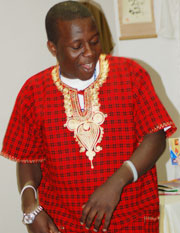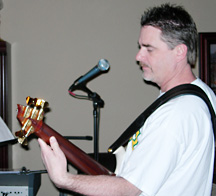CYBER COLUMN by Jinny Henson: Thank God he’s no helicopter parent
Posted: 3/09/06
CYBER COLUMN:
Thank God he's no helicopter parent
By Jinny Henson
On a flight from DFW to Chicago not long ago, I heard the most audacious example yet of helicopter parenting—a term used to describe the hovering nature of parents engineering their child’s every situation to create a positive result. Blame it on the vapid competition today’s children face or our parental thirst for validation, but these days some parents are hovering; paving the way and quick to indulge.
| Jinny Henson |
Behind me was a mother in her late 30s attempting to instruct her son in California via cell phone how to properly load cartridges into his new Nintendo D.S. player. She had him read the directions to her twice and offered her take on them. The Nintendo, it seems, has a space for both Nintendo games and its forerunner, Game Boy game cartridges. Oddly enough, the Granny Nanny taking care of the kids was of absolutely no assistance. Imagine that.
“Just hang tight, Trevor,” the mother said, with all of the intensity of a Madre swimming the Rio Grande with a bambino strapped to her back. “I’ll call Chase in Minneapolis. I KNOW he’ll know what to do. I’ll call you right back. Don’t move.” There she was, saving the day from afar. Luckily, the plane did not take off for a few minutes (this was not Jet Blue, by the way,) and she successfully trouble-shot from half a country away. Problem solved, I could feel her prideful mother-buzz of going beyond the call waft forward, powerfully penetrating through my flotation device.
If my generation of parents had a good upbringing, we want our children’s to be great. Convinced they will need therapy if they are deprived of The Disney Experience, we get ’em there, spend two days stalking characters who do not exist and gripe at each other from Tomorrowland to Cinderella’s Stinkin’ Castle. Despite knowing that we are building Barbie-sized expectations for our “Little Miss Sunshines,” we press on, expecting that if we work hard enough, our children will succeed and earn a bumper sticker we can proudly display on our car. Frankly, I’d like a sticker with my son’s name and a TV on it, because no one can watch the Disney Channel like my boy.
Oh, how God’s parenting style is different than ours. What I admire tremendously and am most vexed by is God’s self-restraint. He has all of the ability to grease the wheels for his children, yet he does not always choose to do so. In fact, the way of Christ has historically been the way of suffering beginning with his sacrificial life and death. Jesus had not even a rock upon which to lay his head. Jesus’ disciples heard his language about picking up their crosses but were too busy dreaming about their future prestige to pay much attention to crazy talk like that.
I’m not so sure we don’t expect the same. I mean, really, he’s God, the owner of a cattle on a thousand hills. Living for him in this corrupt generation should have some earthly perks, right? That’s what I heard a bleach blonde televangelist on TV claim. It was clearly working for her. Oh, that God would engineer things to work out to make us, and him, look good.
God knows his children are strengthened by the stretch and restrains himself from the quick fix. Personally, I think he’d be way more popular if he would make us all as look as great as Victoria Osteen, be as rich as Bill Gates and as healthy as cancer-survivor Lance Armstrong.
Even though Jesus perpetually cared for the poor and neglected in the Gospels, we have our own American ideals of what would make for abundant life in Christ. Maybe that is why we downplay the sacrifice part and highlight the eternal-treat-bag angle. God surely needs our PR. Oh, that God would replace expired hamsters while we are in school and spare his offspring the harsh realities of life!
I know I am blessed. I know I will never know the pain God has spared me from; I am sure it is monumental, but the invisible God has felt invisible when I have needed his intervention the most and hence allowed me the blessed discomfort of struggle.
Not that I begin to tie up in a succinct little bow God’s reasons for doing what he does, but I do know I have benefited from journeys I never asked to go on. This struggle has born fruit in me for which I never realized I contained seeds. For instance, God allowed me to see the dark side of Christians so that I could empathize with people who have been wounded by dysfunctional Christians. God allowed me to watch my father die and be strength for my ultra-strong mother during that time and God, through his restraint, has allowed me to see the virtue in little things done well regardless of the payoff.
I performed at a retreat with former ABC Nightly News religion correspondent Peggy Wehmeyer. Her tremendously moving words continue to impact me. She noted a Presbyterian pastor’s observation that even in the pre-fall Garden of Eden, Adam and Eve could not have it all. Right in the very center of the garden was a tree they could see yet were forbidden to touch. Although we may want it all, and even may think we deserve it all, we were never intended as the created to have it all.
So remains God, unchanged. We may perpetually rescue and give our children everything they desire, but not so with God. He sees the virtues deep within us that only his disciplined restraint can birth. And his refusal to interfere is love.
Jinny Henson travels the country as a Christian comedienne. John, Maggie Lee and Jack are an endless source of material for her. You can find out more about her at www.jinnyhenson.com
News of religion, faith, missions, Bible study and Christian ministry among Texas Baptist churches, in the BGCT, the Southern Baptist Convention ( SBC ) and around the world.






